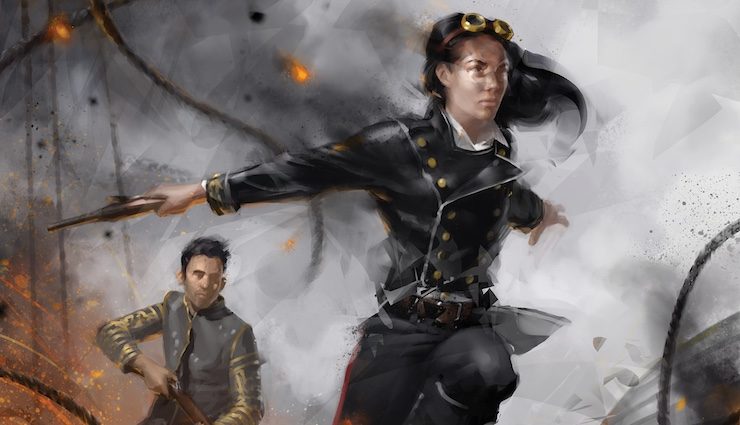They say it’s not the fall that kills you—for Josette Dupre, the Corps’ first female airship captain, it might just be a bullet in the back.
On top of patrolling the front lines, she must also contend with a crew who doubts her expertise, a new airship that is an untested deathtrap, and the foppish aristocrat Lord Bernat, a gambler and shameless flirt with the military know-how of a thimble. Bernat’s own secret assignment is to catalog her every moment of weakness and indecision. So when the enemy makes an unprecedented move that could turn the tide of the war, can Josette deal with Bernat, rally her crew, and survive long enough to prove herself?
Author Robyn Bennis may have perfected the art of The Thrilling Action Sequence. Below is just one example from her forthcoming military fantasy adventure novel The Guns Above—out on May 2nd from Tor Books—in which Lord Bernat learns the effective use of gunpowder shells against ground-based troops…
While the crew cut wide beechwood fuses and hammered them into shells, Bernat quietly asked Josette, “Is this entirely safe?”
“May I remind you that you’re aboard an airship,” she said. “Nothing we do is entirely safe.”
He frowned. “I mean to say, where would we be if a stray spark set off one of these shells?”
She stared at him. “Technically speaking? We’d be in a lot of places. The surrounding woods and countryside, to begin with. If these winds hold up, parts of us might even make it to Halachia.”
As Bernat watched another load of shells being carried down from the magazine, he said, “Well, I’ve always liked to travel.”
Kember croaked out the order: “Light match.” The cannoneers lit their slow matches and placed them into buckets within arm’s length of the gunpowder-filled shells.
“Bow down seven degrees,” Josette said. “When ordered, bombers will throw for the guns, not the cannoneers. Aim your throws but don’t wait to see where they fall. Just go right on to the next shell. Everyone understand?”
The bombers nodded and took their stations, three to a rail. Perhaps a quarter of a mile ahead, the Vin cannons fired, briefly illuminating forest, road, and cloud cover.
“Light fuses,” Ensign Kember said. At the order, the bombers put slow match to their shells. The fuses hissed and spit sparks, and it seemed to Bernat that they were burning down toward the gunpowder-filled shells at an alarming rate.
“Fire carcass,” Josette said, and quickly covered her eyes.
Bernat followed her example, and only looked after the gun fired. He wasn’t sure what to expect when he heard “carcass,” but it turned out to be an incendiary round, a bright yellow comet streaking toward the cannons, now only a hundred yards ahead. It skipped off the road just behind the Vin artillerymen and sailed over their heads to land on the far side of the protective gabions. From there, it skittered off into the woods, where it continued to burn and illuminate the battery.
“Good enough,” Josette said, just before a trio of musket balls pierced the deck from below. The carcass round had illuminated her airship as effectively as it had the Vin cannons.
Looking down, Bernat found the soldiers on the road even less visible than before. They were too far from the carcass round, which had ruined his night vision. Only when one of them fired could he pick the man out and shoot back. So he took a rifle, waited for a flash, and then fired at it.
Only after the smoke cleared did it occur to him that it was pointless to shoot at a man who, having already discharged his musket, couldn’t hope to get another shot off before Mistral was out of range. As he traded his rifle for a fresh one, Bernat quietly hoped that he hadn’t hit his target. It was one thing, after all, to shoot at a man who might otherwise kill him or his crewmates. What he was doing now, however, struck him as something akin to murder.
“Ready bombs,” Kember said.
The bombers at the rails hefted their first shells, holding the heavy spheres against their collarbones, with fuses fizzing inches from their faces.
The captain’s eyes were fixed on the gun battery closing fast ahead, where the Vin artillerymen were already abandoning their pieces and running for the cover of the woods. She held her hand up. Mistral’s bow was nearly over the guns before she shouted, “Now!” She brought her hand down, though only Bernat saw it in the darkness.
“Drop!” Kember shouted, her enthusiasm winning out against the captain’s advice and common sense.
The bombers hurled their shells forward. They picked up the next shells and had them over the side before the first ones even hit the ground. Then they dropped the next, and the next. By the time the bomber nearest Bernat loosed his fifth shell, he didn’t so much throw it as hastily dump the smoking bomb overboard, double-handed.
The shells bounced like leaping fleas, the mass of them nearly keeping pace with Mistral as they skipped over the road below. Many of them, perhaps more than half, deflected uselessly into the woods on their first or second bounce. A few plopped into muddy spots and stopped well short of the guns. The remainder skipped or rolled or skidded into the battery, either stopping against the gabions or coming to rest between the gun carriages.
Bernat ducked as a volley of muskets peppered the rails. When he looked again, Mistral was past the battery and moving away fast.
Josette stood at the taffrail, looking back. She pointed and said, “Shoot that fool!”
The other rifleman fired immediately, but it took Bernat a moment to realize just what he was supposed to shoot at. It was a man—an artilleryman, he thought—running between shells, pulling their fuses out.
“Shoot him, Bernie!” Josette shouted, taking a rifle.
The range grew noticeably longer as he aimed. Josette fired but missed. Bernat fired. When the smoke cleared, the artilleryman was down, and desperately dragging himself away from the battery.
A shell burst in the woods. Another went off behind the battery, and then all the rest seemed to go off together. The guns were hidden behind the flash and the smoke. The gambions disintegrated, throwing rubble a hundred feet in every direction. One shell was kicked upward by the detonation of its neighbors and exploded a hundred feet in the air.
As the last few straggler shells exploded in the woods, Josette turned to Bernat and said, “Just like bowling ninepins.”
Look for more thrilling excerpts from The Guns Above!











